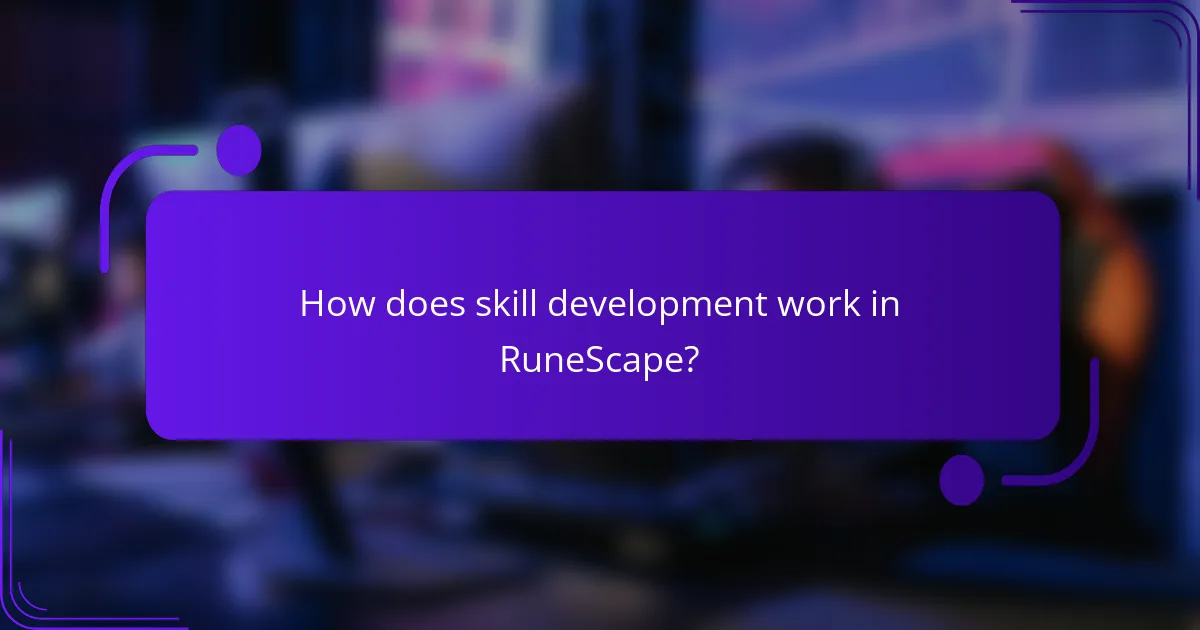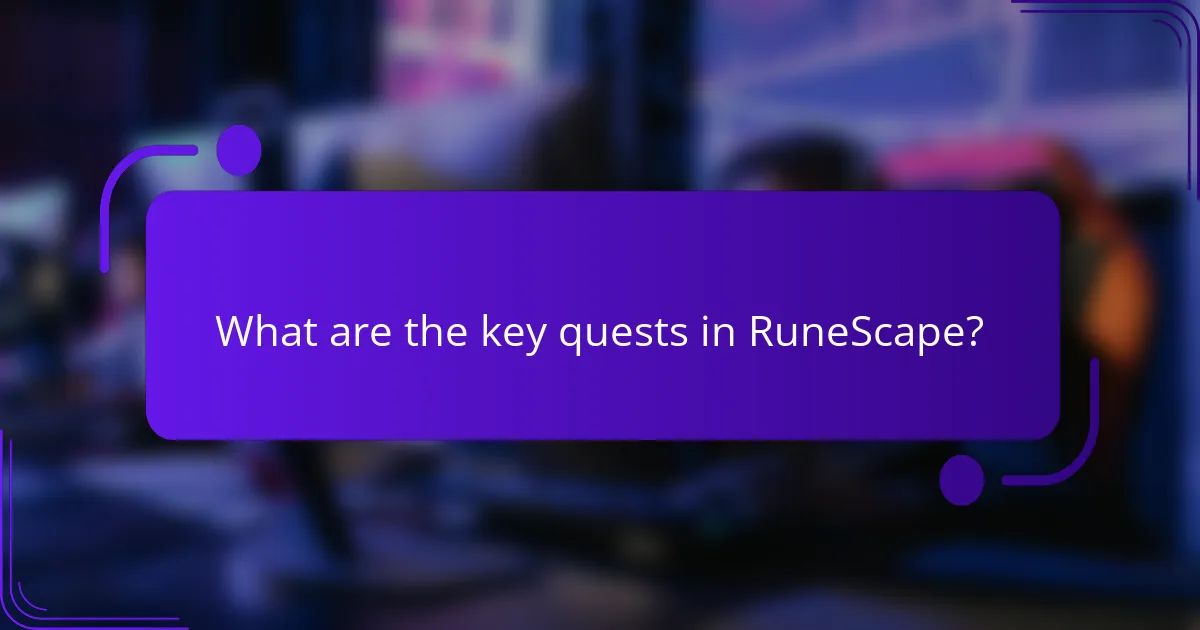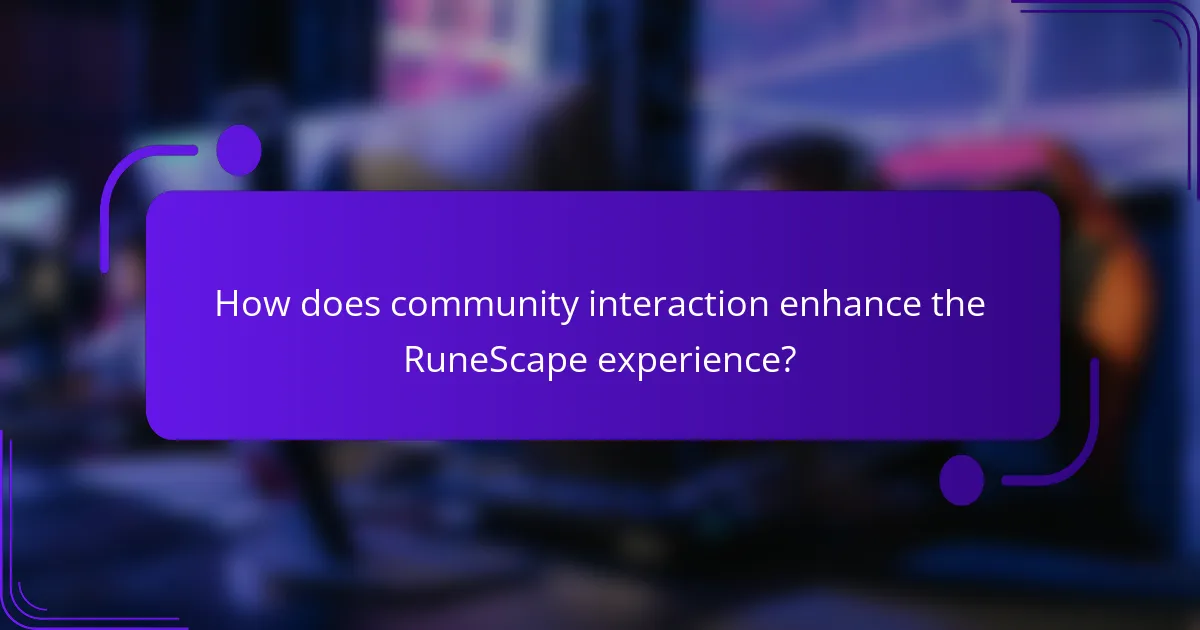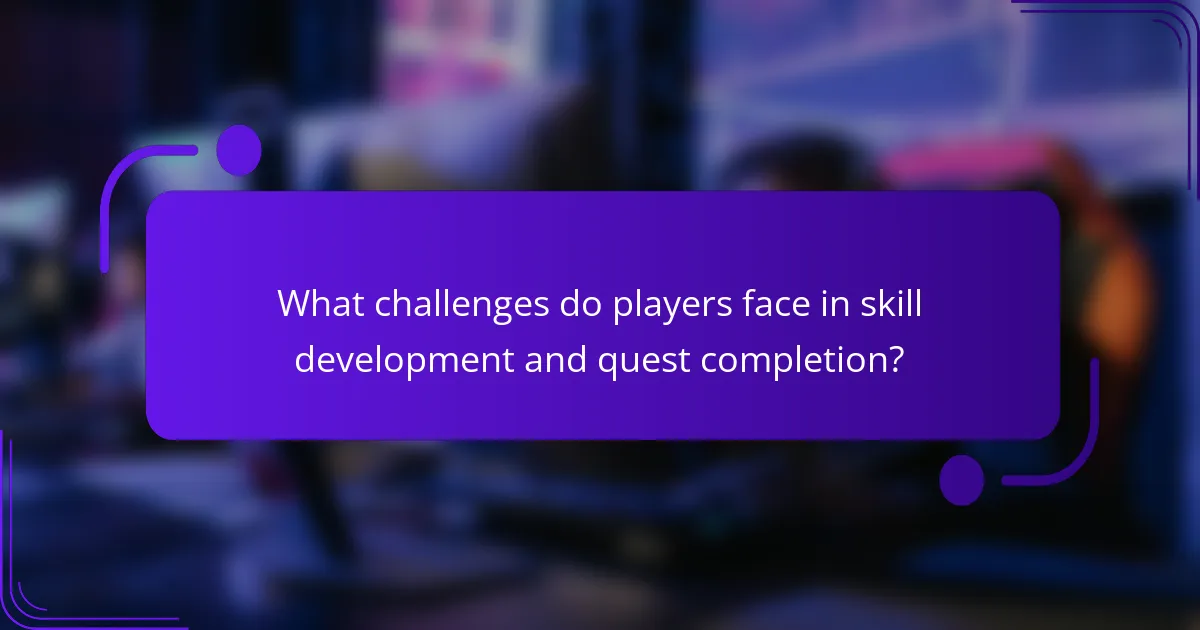Skill development in RuneScape offers players a chance to enhance their abilities through various activities. Engaging in quests provides valuable experience and unlocks new skills. Community interaction fosters collaboration and knowledge sharing, enhancing the overall gaming experience. Players navigate challenges such as resource scarcity and quest complexity while enjoying a vibrant social environment.

How does skill development work in RuneScape?
Skill development in RuneScape occurs through various activities that enhance player abilities. Players gain experience points by engaging in tasks related to specific skills, such as combat, crafting, or gathering. Each skill has a unique progression system where higher levels unlock new abilities and options.
Quests play a significant role in skill development, often requiring specific skill levels to access. Completing quests provides experience rewards, further advancing skills. Community interaction enhances skill development through collaboration, trading, and sharing knowledge. Players often form groups to tackle challenges, share tips, and assist each other in achieving goals.
Overall, skill development in RuneScape is a multifaceted process that combines individual effort, quest participation, and community engagement to foster growth and advancement.
What are the primary skills available to players?
Players in RuneScape can develop a variety of primary skills, including combat, gathering, and artisan skills. Combat skills enhance player abilities in battles, while gathering skills focus on collecting resources. Artisan skills allow players to craft items and enhance their gameplay experience. Each skill has unique attributes, such as experience points and levels, contributing to overall character development and community interaction.
Which skills are essential for PvE and PvP gameplay?
Essential skills for PvE and PvP gameplay in RuneScape include combat proficiency, resource management, and strategic planning. Combat skills like Attack, Strength, and Defence are crucial for both player-versus-environment and player-versus-player scenarios. Resource management involves gathering and utilizing materials effectively, enhancing gameplay efficiency. Strategic planning is vital in PvP, where anticipating opponents’ moves can lead to victory. Each skill contributes uniquely to the overall gaming experience, enhancing both individual and community interactions.
How can players efficiently level up their skills?
Players can efficiently level up their skills in RuneScape by focusing on skill training methods, completing quests, and engaging with the community. Prioritise skills that offer the best experience rates, such as Woodcutting or Fishing, and utilise experience-boosting items. Completing quests often provides significant experience rewards and unlocks new training methods. Additionally, joining clans or participating in community events fosters collaboration and shared knowledge, enhancing skill development.
What role do skill guides play in player progress?
Skill guides significantly enhance player progress by providing structured paths for skill development. They offer strategies, tips, and insights that streamline the learning process. These guides help players understand the most efficient methods to level up in various skills, thus optimising their gameplay experience. Additionally, they foster community interaction by encouraging players to share their own tips and experiences, creating a collaborative environment. This collective knowledge not only aids individual players but also strengthens the overall RuneScape community.

What are the key quests in RuneScape?
Key quests in RuneScape include “Dragon Slayer,” “The Grand Tree,” and “Recipe for Disaster.” These quests enhance skills, provide unique items, and deepen community interaction. Players often seek these quests for their rich narratives and rewards. Notable attributes include quest difficulty, experience rewards, and item unlocks.
How do quests contribute to skill advancement?
Quests significantly enhance skill advancement in RuneScape by providing experience points, unique challenges, and access to new skills. Completing quests often rewards players with substantial experience boosts, allowing for faster progression in various skill areas. Additionally, quests introduce unique gameplay mechanics that encourage players to develop their problem-solving abilities. Engaging in quests fosters community interaction, as players often collaborate or seek advice, further enriching the skill development experience.
Which quests are considered must-do for new players?
New players in RuneScape should prioritise the following must-do quests: “The Restless Ghost,” “Cook’s Assistant,” “The Knight’s Sword,” and “Dragon Slayer.” These quests provide essential skills and unlock important game features.
1. The Restless Ghost – Introduces prayer and provides experience.
2. Cook’s Assistant – Teaches cooking basics and grants experience.
3. The Knight’s Sword – Rewards players with smithing experience and access to higher-level equipment.
4. Dragon Slayer – Unlocks the ability to wear dragon equipment and significantly boosts combat skills.
Completing these quests enhances skill development and community interaction in the game.
What are the rewards for completing high-level quests?
Completing high-level quests in RuneScape offers significant rewards, including experience points, unique items, and access to advanced content. These rewards enhance skill development and community interaction. Players gain valuable experience boosts that accelerate skill progression. Unique items can provide advantages in gameplay, while access to advanced areas or quests opens new opportunities for exploration and collaboration with other players.
How do quests vary between different game versions?
Quests in RuneScape vary significantly between game versions due to updates and changes in design philosophy. Older versions often focus on linear narratives, while newer iterations emphasise player choice and complex storylines.
For example, quests in Old School RuneScape (OSRS) maintain a nostalgic feel with simpler mechanics, while RuneScape 3 introduces advanced features like cutscenes and voice acting. The introduction of new quests often aligns with seasonal events, enhancing community interaction and engagement.
Additionally, quest difficulty scales with player progression, offering varied challenges. Unique quests in each version may include exclusive rewards, further differentiating the gameplay experience.
The evolution of quests reflects broader trends in gaming, prioritising immersive storytelling and community involvement.

How does community interaction enhance the RuneScape experience?
Community interaction significantly enhances the RuneScape experience by fostering collaboration and social engagement. Players can join clans, participate in events, and share resources, which enriches gameplay. This interaction leads to skill development, as players often exchange tips and strategies. Additionally, quests can be tackled more effectively in groups, promoting teamwork. The unique attribute of community-driven content, such as player-created events, further deepens immersion and enjoyment. As a result, the overall gaming experience becomes more dynamic and fulfilling.
What are the main forms of player communication?
Players in RuneScape primarily communicate through text chat, voice chat, and emotes. Text chat allows real-time messaging, while voice chat enhances interaction during group activities. Emotes enable players to express emotions non-verbally, fostering community engagement.
How do clans and guilds impact gameplay?
Clans and guilds significantly enhance gameplay by fostering community, collaboration, and resource sharing. They provide players with social connections and support, which can lead to improved skill development and quest completion.
Participating in a clan or guild often grants access to exclusive events, resources, and knowledge-sharing opportunities. This collaboration can accelerate skill progression and help players tackle challenging quests more effectively.
Moreover, clans often organise activities that encourage teamwork, such as boss fights and minigames. These events not only strengthen bonds among members but also create a sense of belonging within the game, enriching the overall experience.
Lastly, clans can impact the economy within RuneScape by pooling resources and influencing market trends. This collective effort can lead to unique opportunities for players to engage in trade and crafting, further enhancing gameplay dynamics.
What community events are popular among players?
Community events popular among players include skill competitions, questing parties, and seasonal festivals. These events foster teamwork and enhance player interaction. For example, the “RuneScape Skill of the Month” encourages players to focus on specific skills, while holiday events like “Christmas in RuneScape” offer unique quests and rewards. Additionally, player-organised events, such as drop parties, create a sense of community and excitement. These activities not only enrich the gaming experience but also strengthen social connections among players.
How do player-driven economies function in the game?
Player-driven economies in RuneScape function through player interactions, trading, and resource management. Players create and influence market dynamics by supplying items and services. The economy is shaped by demand for skills, quests, and crafted goods. Unique attributes, such as rare items and player-set prices, enhance economic complexity. As a result, community engagement fosters a vibrant trading environment, impacting gameplay and skill development.

What challenges do players face in skill development and quest completion?
Players face various challenges in skill development and quest completion in RuneScape. These include resource scarcity, time constraints, and the complexity of quests.
Resource scarcity limits access to necessary materials for skill training and quest items. Time constraints hinder players from dedicating enough hours to progress effectively. The complexity of quests often requires specific skills or items, creating additional barriers to completion.
Community interaction can also present challenges. Players may experience difficulties finding groups for collaborative quests or receiving guidance from more experienced players.
Overall, these factors can impede progress and enjoyment within the game.
How can players overcome common obstacles in leveling skills?
Players can overcome common obstacles in leveling skills by utilising effective strategies and community resources. Engaging with the RuneScape community offers support, advice, and motivation. Players should prioritise skill training methods that align with their goals, such as focusing on high-experience activities or completing relevant quests. Additionally, players can leverage guides and tutorials to enhance their understanding of skill mechanics and optimal training routes. Setting achievable milestones can also keep players motivated and track their progress effectively.
What are typical pitfalls in questing and how to avoid them?
Common pitfalls in questing include inadequate preparation, poor time management, and lack of community engagement. To avoid these, ensure you research quests thoroughly, allocate sufficient time, and actively participate in community discussions. Proper planning enhances skill development and enriches the overall RuneScape experience.

What unique features set RuneScape apart from other MMORPGs?
RuneScape stands out from other MMORPGs due to its deep skill development, extensive quests, and strong community interaction. Unique features include a diverse range of skills that players can develop, allowing for personalised gameplay experiences. The quest system offers rich narratives and varied challenges, enhancing player engagement. Community interaction is fostered through player-driven events, trading, and collaboration, creating a vibrant social environment. Additionally, RuneScape’s frequent updates and expansions ensure that content remains fresh and relevant, further distinguishing it from competitors.
How does the game’s lore influence gameplay and quests?
The game’s lore significantly enhances gameplay and quests by providing context and motivation. Players engage more deeply with the storylines, enriching their experience. Lore-driven quests often reveal unique attributes, such as special items or abilities tied to the narrative. As players progress, they encounter rare lore elements that influence their skill development and community interactions, fostering a sense of belonging and purpose within the game world.
What are the rare items and achievements available in RuneScape?
Rare items and achievements in RuneScape include unique rewards from quests, specific skill milestones, and limited-time events. These items often feature unique attributes that set them apart, such as the “Party Hat” from the 2001 Christmas event or the “Max Cape” for achieving level 99 in all skills. Additionally, achievements like “Completionist Cape” signify extensive game mastery, making them rare and sought after among players. Other notable rare items involve discontinued holiday items and special event rewards that cannot be obtained again.
How does RuneScape’s community shape its evolving content?
RuneScape’s community significantly influences its evolving content through feedback and collaborative engagement. Players actively contribute ideas for skill development and quest design, which developers often incorporate. The community’s input leads to unique attributes in gameplay, fostering a dynamic environment that adapts to player preferences. Rare events, like community-led challenges, further enhance the game’s content, showcasing the importance of interaction in shaping the overall experience.
What are the best practices for maximizing skill development and quest success?
To maximise skill development and quest success in RuneScape, focus on strategic training methods and community engagement. Prioritise skills that complement your questing goals, such as combat skills for fighting quests or crafting skills for item creation.
Engage with the community through forums and social media to gain insights and tips. Join clans or groups that focus on your interests to enhance collaboration and motivation. Utilise in-game resources like guides and tutorials for efficient training techniques.
Set clear, achievable goals for each skill and quest, tracking progress to maintain focus. Regularly participate in events and activities that offer experience boosts or unique rewards, enhancing both skill growth and quest completion rates.